Senior Patrick Ishimwe, executive officer of nontraditional students, grew up wanting to help people.
Born in Rwanda, moving from there to Congo, to Kenya, and eventually to Togo, where he lived for ten years, Ishimwe grew up in what he described as an “unstable environment.” Yet, he said, “there was always someone to help,” and through that, his family got “all the help we needed.”
Having moved to Buffalo, where he went to City Honors School for two years, Ishimwe eventually arrived at Houghton looking for a Christian environment and a good soccer program. Ishimwe initially did not consider SGA, but during his Sophomore year, a friend, Ben Hardy, convinced him to go to a meeting. Ishimwe was intrigued, and by his Junior year, he ran for the Senate and became part of the SGA. The SGA, he realized, was an opportunity to be a helpful voice on campus.
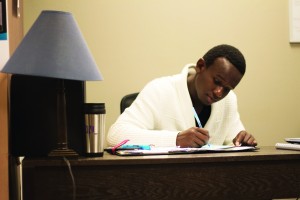
However, among the changes the 2014-2015 year brought was the elimination of the Senate. Again Ishimwe made the decision to participate in SGA, this time becoming the Executive Officer of Nontraditional Students. In this role, Ishimwe deals with reaching out to the students of Buffalo who do not have the opportunity to go to traditional college.
Placing great value on education, Ishimwe is personally invested in the programs. “Education is just the key to success,” he said. In a recent Facebook post, Ishimwe wrote, “Jesus did not die on the cross just for us to live an average life.” He said, “Education showed me you don’t have to lead that life.” In his SGA position, Ishimwe is able to share this opportunity with students who otherwise would have no access to it. “They’re no different from us,” said Ishimwe, “We’re just fortunate enough to be able to afford to go here.”
Having attended school in Buffalo, Ishimwe has a personal understanding of the purpose and value of the programs for nontraditional students. He discovered that one of the students in the program was a good friend, and was able to see the positive effects. He noticed that his “friends from high school struggle with staying in college and getting a degree.” Ishimwe, in his position, is now able to see the tangible results of the programs.
Ishimwe describes his office as giving Buffalo students in the program “a voice on campus.” He keeps the SGA informed on how the programs are going, but also is responsible for sharing opportunities for involvement with other Houghton students. He and SGA president Katharine Labrecque have formed a committee that will be bringing in lecturers and possibly Buffalo residing Houghton alumni, who will inform Houghton students of opportunities to serve in Buffalo.
Patrick Ishimwe is a political science major, minoring in business and French. His desire to help people, to make a difference, is the root for his ultimate dream of going to law school and working with the United Nations. For now, he speaks for himself and reminds Houghton students, “Buffalo is a mission.” Although there is much to address for the rest of the world, for now “it’s preparation for future experiences.”

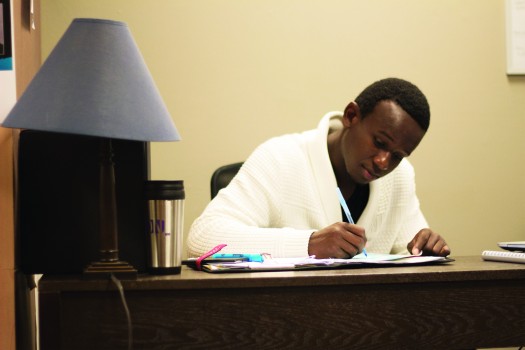
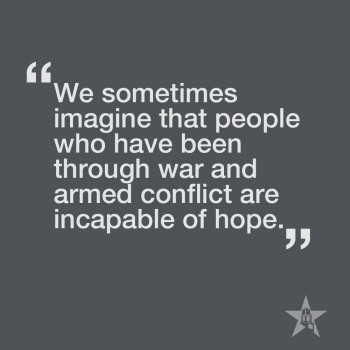
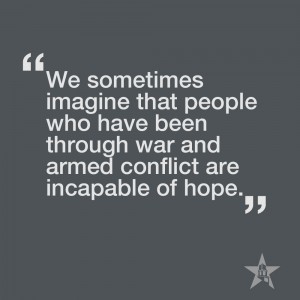
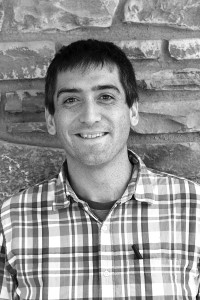 This reality makes me especially excited for this year’s Faith and Justice Symposium, with the theme “Stories of Hope.” We sometimes imagine that people who have been through war and armed conflict are incapable of hope. Places like Somalia, the Ukraine, Iraq, the Sudan (and other nations like Rwanda and Ethiopia before them) become bywords, shortcuts we use to approximate otherwise unimaginable suffering. “There can be no hope there,” we say, “unless those of us who follow Jesus bring hope to the hopeless,” and in so saying we honor not Jesus but ourselves.
This reality makes me especially excited for this year’s Faith and Justice Symposium, with the theme “Stories of Hope.” We sometimes imagine that people who have been through war and armed conflict are incapable of hope. Places like Somalia, the Ukraine, Iraq, the Sudan (and other nations like Rwanda and Ethiopia before them) become bywords, shortcuts we use to approximate otherwise unimaginable suffering. “There can be no hope there,” we say, “unless those of us who follow Jesus bring hope to the hopeless,” and in so saying we honor not Jesus but ourselves.